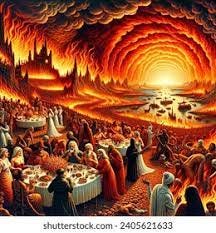I am holding two stories this morning. A current story in the New Yorker about Indigenous Ecuadorians who, facing severe climate-driven drought in their mountainous home in the Andes and lured by TikToc images of Times Square and the American Dream, risk their lives to migrate to places like Brooklyn where they live in heart breaking poverty. And the story of Los Angeles, another icon of the American Dream, burning literally to the ground.



As these stores combine in my mind, and visions of the flames leaping higher merge with the roar of the wind and flame obliterating the shiny trophies and trinkets of our consumer society, I can’t help but hope for something.
Hope this will be the call, the slap that wakes us to our folly, the omen that induces us to examine our part in this fire, fed as it is by the climate-induced drought in the forests and fields of California; our part in Ecuador’s dying orchids, shriveled avocado and potato crop and the migration of thousands from their ancestral homelands, once places of abundance, now slowly dying from thirst.
The American Dream: unfettered progress, growth, the great frontier, westward expansion! But as I imagine the burning on the cliffs at the edge of the Pacific, the farthest reaches of that frontier, I am reminded of Dante’s experience in the Sixth Circle of Hell, and like Dante, I too must now bear witness to the flaming consequences of that expansionist fantasy and my part in that fantasy.
It’s all going up in flames before our very eyes, this moment, the moment when we’ve officially blown past 1.5 degrees of global warming, the milestone we were warned that if we crossed, devastating consequences would follow.
Will we, like Dante, find salvation in witnessing the corruption, the greed, the sins against nature or will we remain blind to the immorality of our behavior and be condemned to eternal fire?
Will this burning teach us another message about the value of that multimillion-dollar house, that closet full of designer clothes, that Jenn Air refrigerator and Missoni rug? Once it’s all gone, isn’t it easier to let go, to say what matters is love and the beauty of the morning sky and our connections to each other?
Our biggest corporations, our rich billionaire tech bros, our about-to-be President: none of them wants you to see this as an omen. They want to keep you blind and blame endangered smelt, LGBTQ hires, Governor Newsom, anyone but themselves and their money and power-grubbing plans for the future.
But can you and I take in the lessons of this fire? Can we look into our own lives and say, this isn’t working, my internalization of the story of progress and consumption has brought this on. I must stop. I must find another story about what it means to be a good citizen, a good steward, a person who cares for her homeland?
What do I know from my 50 years of work as a psychotherapist about how this critical change can happen? What advice do I have for myself, my friends, my readers? First, don’t project the blame onto others. Don’t even try at this point blaming the people who don’t believe in man-made climate change, don’t even blame Elon and his buddies. Or Citi Bank. Or Exxon. Projection is cheap and spineless and won’t make you any happier. Projection is a way of giving over all agency.
By all means, acknowledge that corporate America is part of the problem but with every CITI bank purchase of another unneeded doodad, or in-fashion coat or steak from Argentina, or flight to Brazil, know that you are the person supporting Elon and his buddies and helping corporate America flourish. You and I won’t die if we stop ordering from Amazon this year…but someone else, someday soon, might.
Taking responsibility is not meant to overwhelm us with guilt and shame. That will get us nowhere but in bed with the covers over us. Acknowledge the power of the corporate sham to make you think your next purchase will bring eternal happiness and make you look beautiful and put the credit card away and silently tell them to ****off. Instead write a note to a friend who needs a little cheering up, take a walk in the woods and see what has bloomed. Read Wendell Berry’s poems, Robin Wall Kimmerer. Read Full Ecology: Repairing our Relationship with the Natural World, by Mary Clare and Gary Ferguson, read What If We Get It Right by Ayana Johnson.
Be creative. Wonder. Imagine the freedom of a different life not bound to stuff and big houses and shuffling all that stuff around those houses. Play with these new ideas. Find childhood delight in new ways of seeing the rocks in your backyard, the slugs that inhabit your garden, the sunrise. Make nature your mother again and feel your relationship to her, not to your new shoes.
Talk, talk, talk to your friends and family about waking up to the idea that this culture is based on assumptions about nature and mankind that once worked for us, but which are now revealing themselves to be dangerous. Find stories of people living whole and happy lives outside of this consumer culture and be inspired by them.
There is much discussion in the press about what comes next for California, but I have seen almost none of that discussion address the underlying themes of our own blind culpability in the way that a thinker like Dante might have. Instead, the discussion is about technological inventiveness like new piping infrastructure or “hardening” homes so they aren’t so vulnerable to flames.
Even David Wallace-Wells, whose groundbreaking book, The Uninhabitable Earth, woke me to my own gluttonous participation in an over the top consumer culture, seems to have given up talking about the causes of this fire and jumped on the bandwagon of preparation. While I agree of course that preparing for the next fire by having enough piping to get water to that fire is important, I worry that it is again a way to distract ourselves from the bigger story of how to live on this planet in a different way.
The American Dream needs to burn and in its place we need to find another dream, another story. It isn’t written yet. We must write it together.




I won’t die if I don’t buy another doodad, and I won’t change the system, either. In limited situations boycotts can work, but a global boycott is not possible. Managing the on-the-way next crisis does demand some attention. I don’t know what percent of all jobs in the world are needed to sustain life, but eliminating the useless ones (millions ? billions?), were it to happen in an instant, would create its own kind of chaos. Yes, we need a new system of incentives and disincentives, and IF we produce the right one it will sadly be on considerable more wreckage already in the works. The old world is dying, and the new is struggling to be born. Dream as we struggle to mitigate, as we attend to the damage, fight the managers of the poisonous incentives, and replace both with better ones, but at the individual level we might just have to be content with just trying to do the right thing.
This piece says it all. I immediately forwarded it to 11 people with the following messageHello,
You are one of just 11 people I know who will really appreciate this little piece by Kathleen Sullivan, a nature-loving retired psychoanalyst who lives in Freeport. My reaction was "Damn, this is GOOD," and I don't say that about very many of the things I read on the subject of climate change. Oh don't you wish we could get more people to think this deeply about the implications of the LA wildfires?